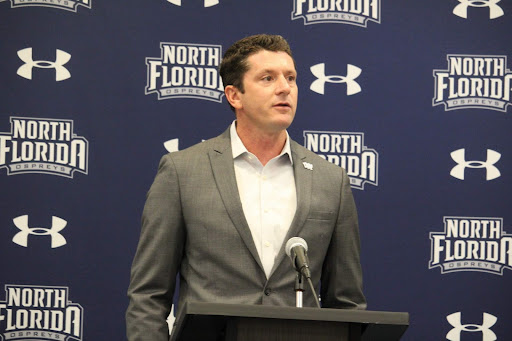University students of Florida are in danger of losing their voice. On top of all the budget cuts, tuition hikes, increased fees and the ludicrous bashing of certain university programs that students have been forced to endure over the past few years, we may just lose our ability to fight such things as well.
As you can read on page 7 of this week’s Spinnaker, state congressmen introduced a bill that would take the voting power to elect a representative on the Board of Governors away from students. Check out the bill here: http://www.flsenate.gov/Session/Bill/2012/1508/BillText/Filed/PDF.
Currently, the Florida Student Association, which consists of the student body presidents from 10 of the 11 state universities, elects a member, usually the chair, to represent students on the BOG. This gives students an essential elected voice on the governing body of the state university system.
If this new bill passed, Gov. Rick Scott would have the power to appoint a student body president of his choosing, leaving students with no say. This bill sends a message to students that they don’t matter.
Who in their right mind would think that it makes more sense to let Gov. Scott choose the student that represents us in Tallahasse than, say, the likes of UNF Student Body President Matt Brockelman or current FSA chair and New College Student Body President Michael Long? Say what you want about Brockelman, but the Spinnaker makes the bold suggestion that he knows more about students than the man who wants to, for all intents and purposes, eliminate liberal arts from the college curriculum.
Florida State University, the only state university that is not an FSA member, apparently thinks Scott knows better. FSU is not only behind the bill, but it is paying thousands to lobbyists every year to help them push this bill through the state legislature.
UNF Vice President of Governmental Affairs Janet Owen, said, despite what many critics of the bill have suggested that this is not a revenge-based bill aimed at Michael Long for calling out Sen. J.D. Alexander in talks about converting University of South Florida-Polytechnic to Florida’s 12th public university. Since the same bill was first introduced in 2011, it stands to reason that this has nothing to do with Long, leaving FSU as the main instigator.
FSA is an organization that has fought since its incorporation in 1976 for student rights in Florida. It acts as a lobbyist for all students in the state university system. It also charges dues to its members. Currently, according to the USF Oracle, it charges $8,500 for membership.
One legislative sponsor of the bill, Matt Gaetz, R-Shalimar, claims his concern with the current arrangement is that because of FSA’s membership fees, the state is involved in “pay-to-play” politics, he said in a Tampa Bay Times article. He’s concerned that the only way to be represented is to pay membership fees.
So the solution is to scrap the whole thing and let the governor choose a student representative? Then no one gets to play at all.
Besides, the FSA has reduced its fees massively in recent years in an attempt to appeal to all universities. In 2008, when former UNF Student Body President John Barnes was vice chair of the FSA, it cost something like a dollar for every full-time student enrolled at the university to get a seat at the FSA table. For large schools like FSU, that was a hefty price tag.
But at $8,500, “You’re not going to get a better bang for your buck for lobbying in government,” Barnes said.
Grant it, in summer 2009, FSA gave schools a legitimate reason to abandon ship. The executive director was found in malfeanse of his contract with questions surrounding his expense reports. Five member schools left the association.
However, by 2010, according to Barnes, the FSA righted the ship and was back to 10 members by 2011. And as chair, Barnes helped restructure FSA’s pay scale to make membership more affordable. But FSU was busy paying its own lobbyists to eliminate the power of the FSA.
In 2011 alone, the FSU Student Government Association paid Tallahassee lobbyist and FSU alum – interestingly also a former member of FSA – Sean Pittman an aggregated total of $45,000. The FSU Board of Directors paid another lobbyist an additional aggregated total of $15,000 that year, in addition to built-in vice president of governmental affairs, whose job is to lobby on behalf of the university. UNF pays no lobbyists outside of salaried staffers such as Owen.
With cash such as that to blow on lobbying, why not just join the rest of the state on the FSA? It’d save money and get the resources of 10 other state universities at its disposal.
The other argument by this preposterous bill’s supporters is that FSU is not represented under the current structure. Even that, though, is full of holes.
According to the FSA website, “The mission of the Florida Student Association is to advocate the interests of the state university students at all levels of government.”
Barnes said the FSA represents all students of the state university system. It works together to ensure the voice of the students is heard. FSU may not have the opportunity to have its student body president on the BOG, but if anything, its students are getting a free ride to representation. So while the rest of the student body presidents of the state work to ensure the fair representation of all students’ voices, FSU is stubbornly standing aside, using its money to pay alums to come up with ways to dismantle the only organization designed to stand up for students and only students.
If you care about being represented, then write to your senator, tell your student leaders and show up at FSA’s Rally in Tally event Jan. 26 in Tallahassee to fight for your right to be heard. Because otherwise, legislators may give that right to Scott. And that’s good for no one.
Email letters to the editor to editor@unfspinnaker.com.
















